9年级人教版全一册Unit 6 When was it invented?Section A 3a-3c 课件(共52张PPT)
文档属性
| 名称 | 9年级人教版全一册Unit 6 When was it invented?Section A 3a-3c 课件(共52张PPT) | 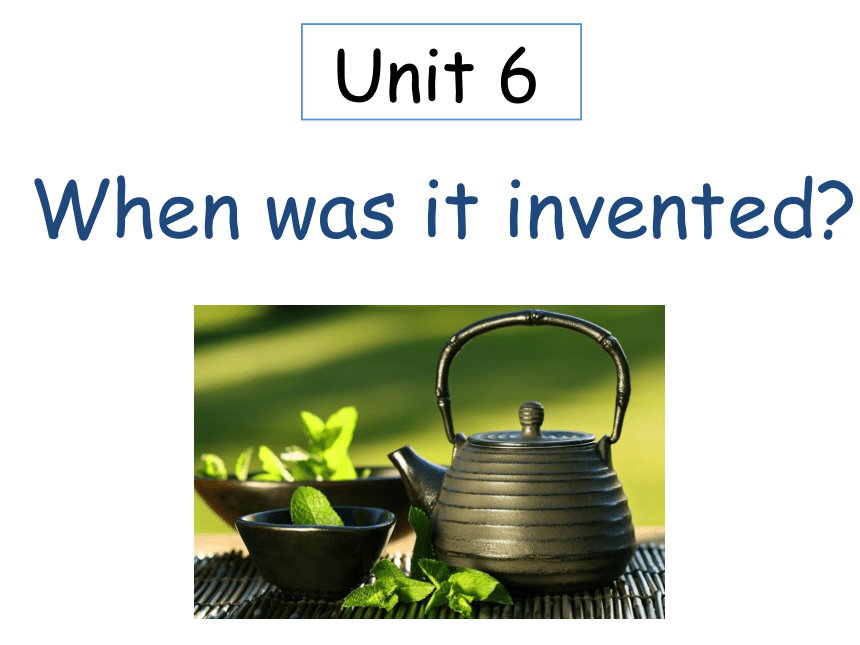 | |
| 格式 | zip | ||
| 文件大小 | 1.5MB | ||
| 资源类型 | 教案 | ||
| 版本资源 | 人教新目标(Go for it)版 | ||
| 科目 | 英语 | ||
| 更新时间 | 2023-01-31 21:06:18 | ||
图片预览

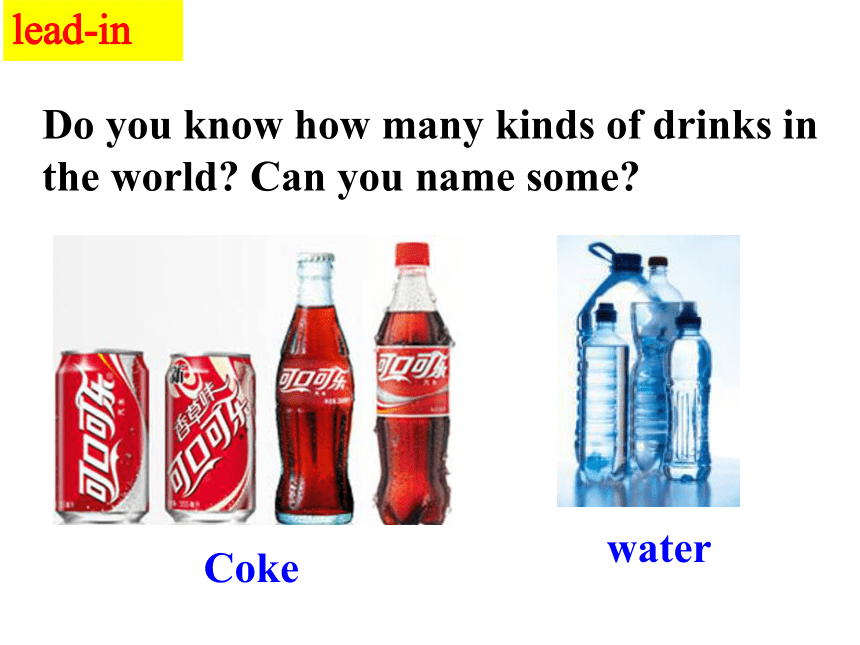
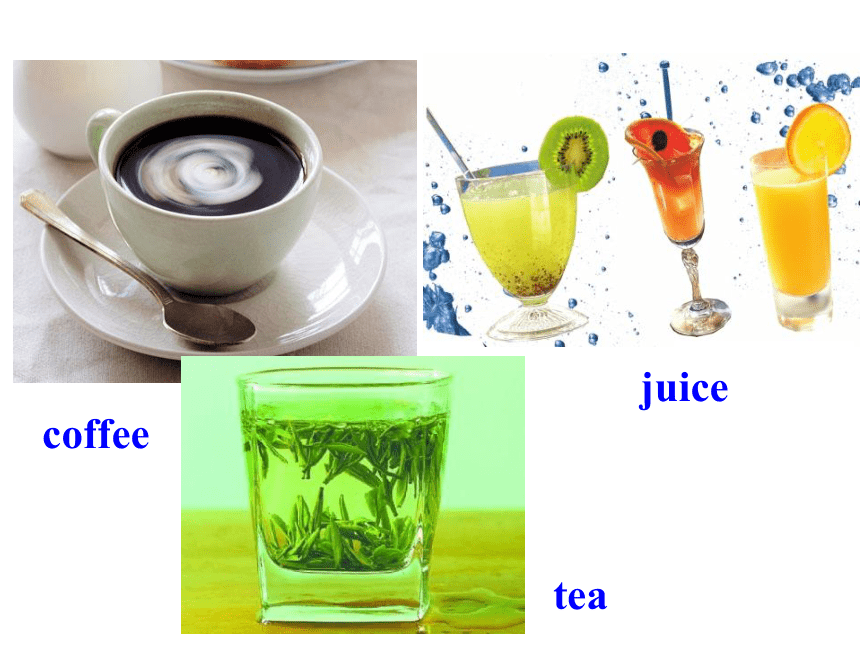
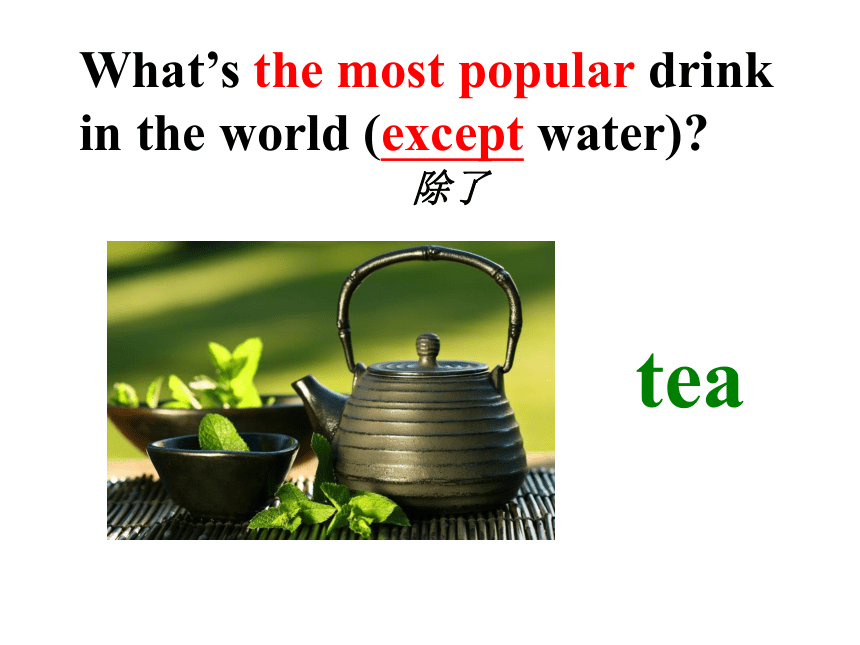
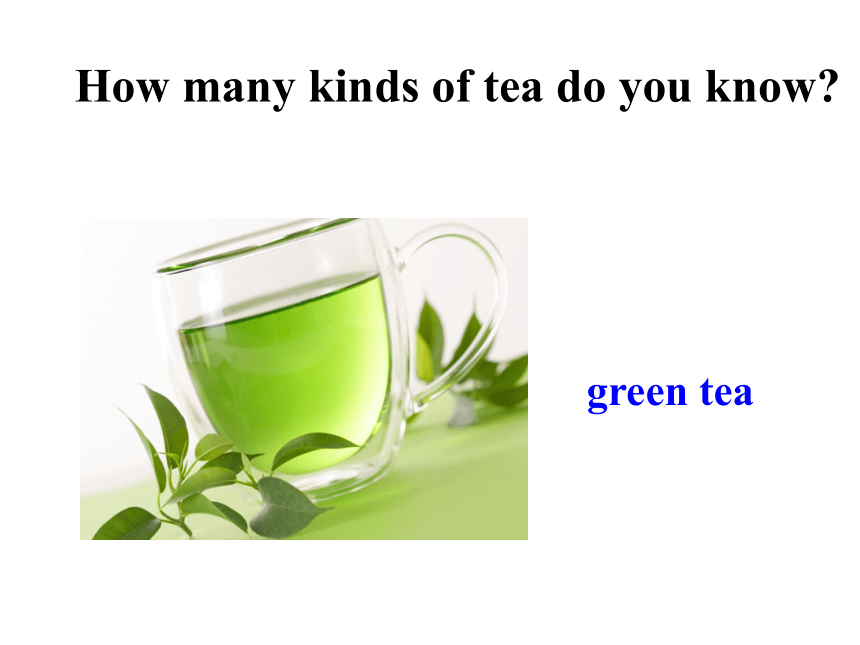
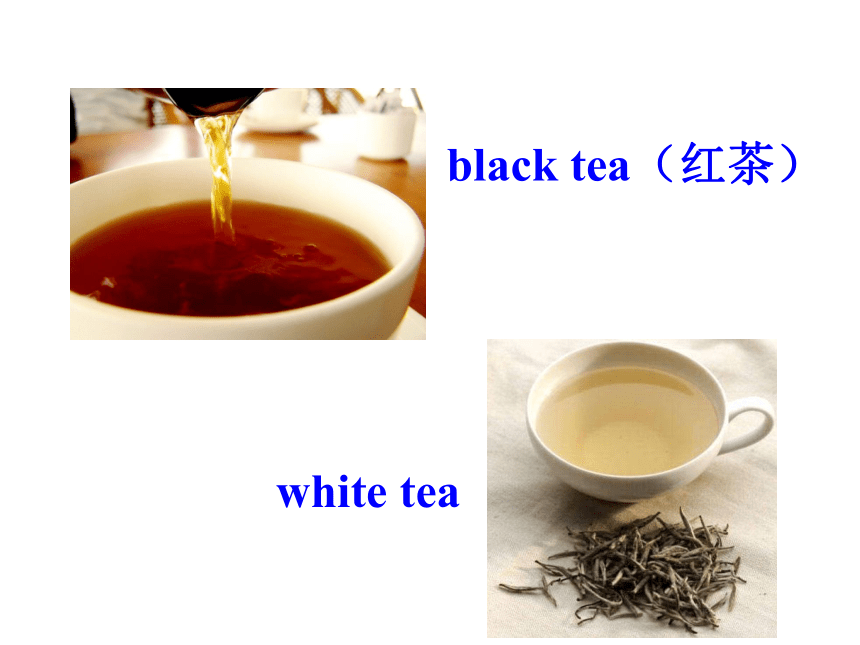
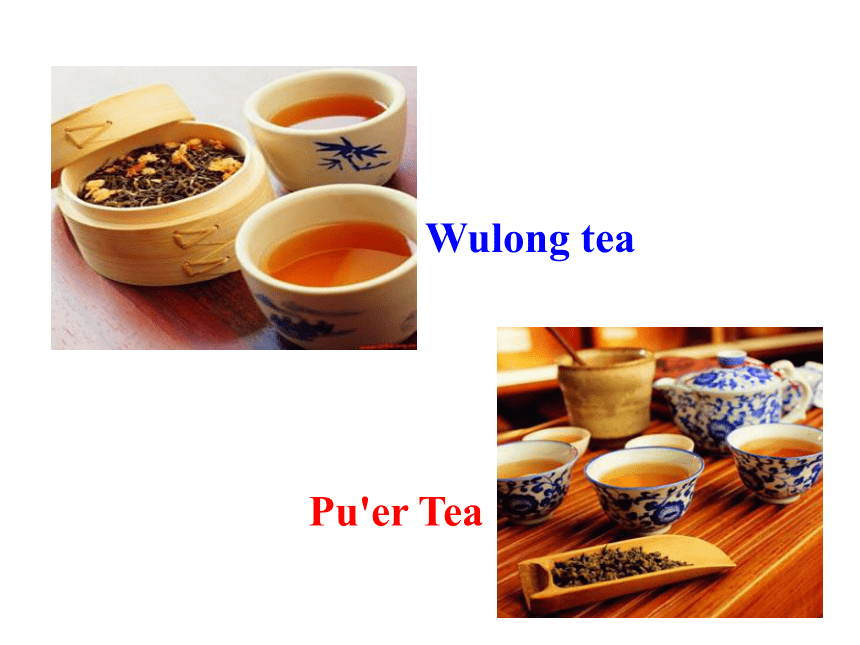
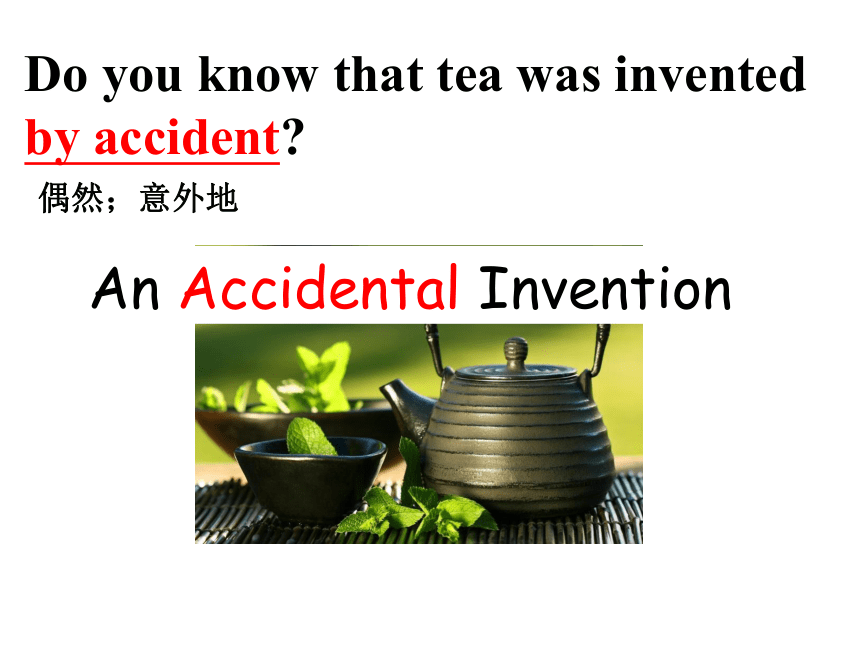
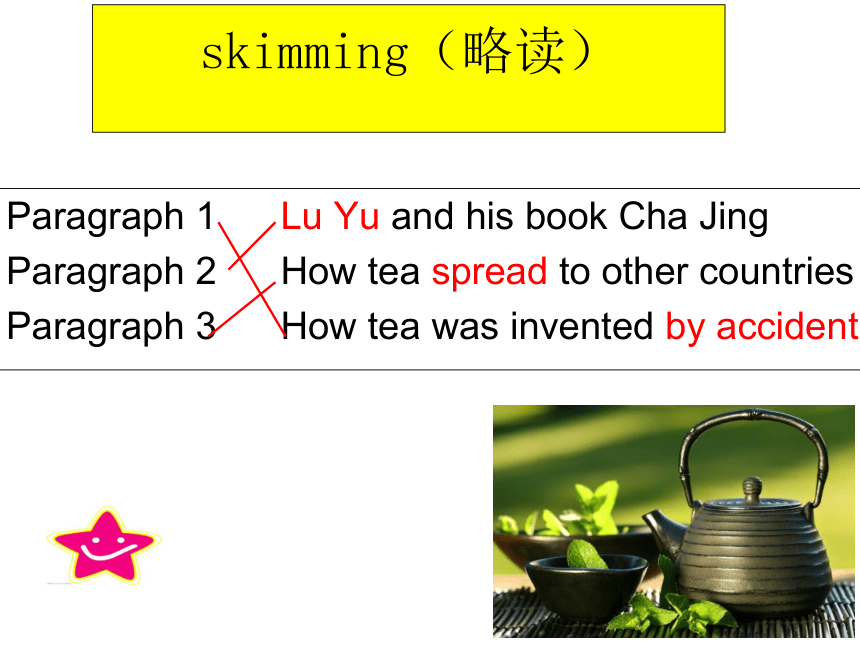
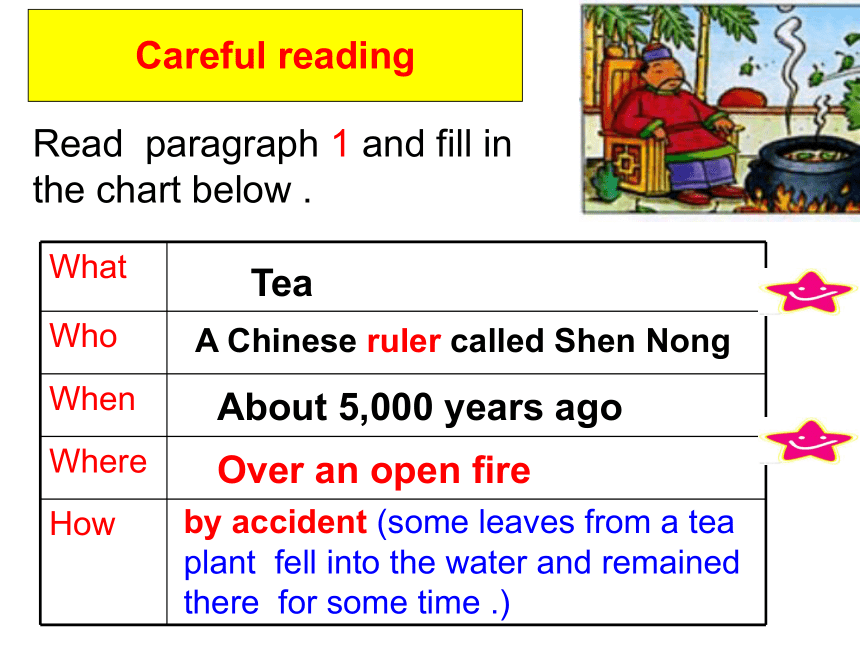
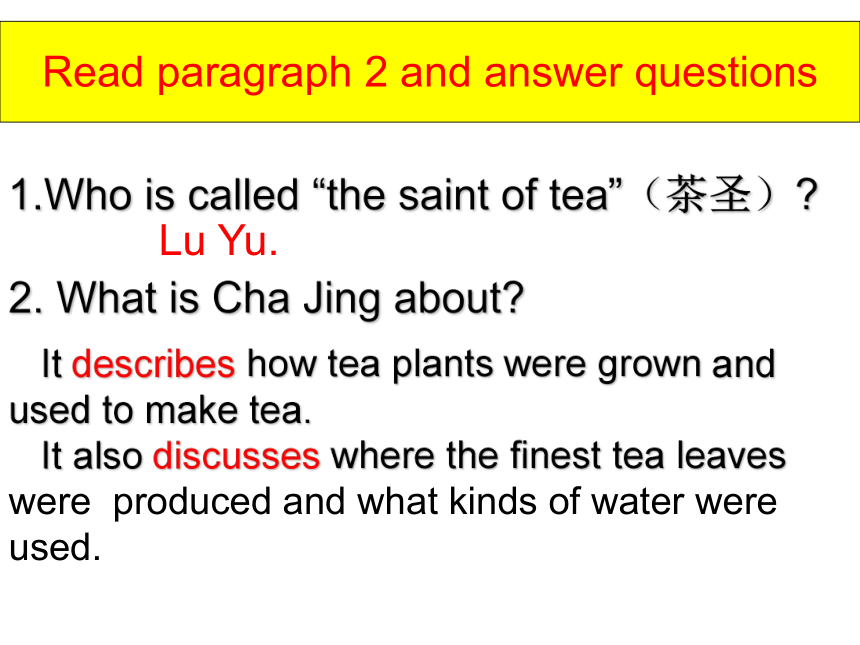
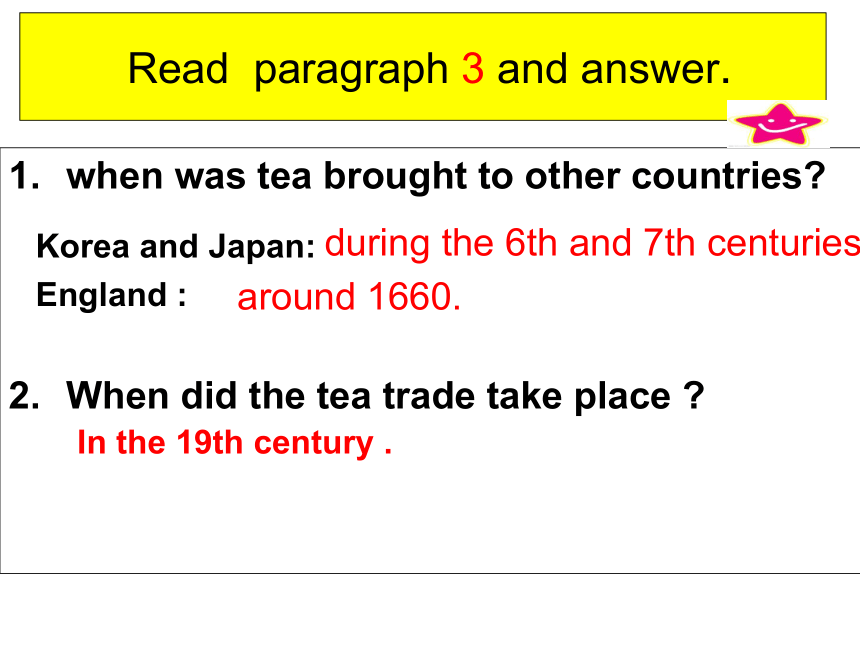
文档简介
(共52张PPT)
When was it invented
Unit 6
Section A 3a-3c
Do you know how many kinds of drinks in the world Can you name some
Coke
water
lead-in
juice
coffee
tea
What’s the most popular drink in the world (except water)
tea
除了
green tea
How many kinds of tea do you know
black tea(红茶)
white tea
Wulong tea
Pu'er Tea
Do you know that tea was invented by accident
偶然;意外地
An Accidental Invention
skimming(略读)
Paragraph 1 Lu Yu and his book Cha Jing
Paragraph 2 How tea spread to other countries
Paragraph 3 How tea was invented by accident
Careful reading
What
Who
When
Where
How
Tea
A Chinese ruler called Shen Nong
About 5,000 years ago
Over an open fire
Read paragraph 1 and fill in the chart below .
by accident (some leaves from a tea
plant fell into the water and remained
there for some time .)
Read paragraph 2 and answer questions
1.Who is called “the saint of tea”(茶圣)
2. What is Cha Jing about
It describes how tea plants were grown and used to make tea.
It also discusses where the finest tea leaves were produced and what kinds of water were used.
Lu Yu.
Read paragraph 3 and answer.
when was tea brought to other countries
When did the tea trade take place
Korea and Japan:
England :
In the 19th century .
during the 6th and 7th centuries.
around 1660.
3c After reading
1.One of the world’s favorite drinks ___________(invent) by accident.
2.Tea was first __________(drink) by Shen Nong about 5000 years ago.
3. A nice smell ____________(produce) when the tea leaves dropped into the hot water.
4. Tea ___________(bring) to Korea and Japan during the 6th and 7th centuries.
5.Tea is _________(trade) between many different countries.
was invented
drunk
was produced
was brought
traded
2 marks
3 marks
1 mark
2 marks
1 mark
4 marks
3 marks
3 marks
2 marks
1. 茶是偶然被发明的。
Tea was _______ _______ _______.
invented
by
accident
填空:
课堂检测:
Lucky!
It is said that a Chinese ruler called Shen Nong was the first to discover tea as a drink.
据说,一个叫做神农的中国统治者最早发现了作为饮料的茶。
课堂检测:
翻译:
Some leaves from a tea plant the water and remained there for some time.
A. fell behind B. fell off C. fell into
课堂检测:
单选:
A few years later , Lu Yu mentioned Shen Nong in his book.
A. thousand B. thousands C. thousands of
课堂检测:
单选:
The book describes how tea plants were grown and used to make tea.
这本书描述了如何种茶树以及怎样制茶。
课堂检测:
翻译:
直到1660年,茶才在英国出现。
In England, tea didn't appear until around 1660.
课堂检测:
翻译:
Even though many people now know about tea culture, the Chinese are without doubt the ones who best understand the nature of tea.
虽然现在很多人知道茶文化, 但中国人民无疑是最懂茶的本质的人。
课堂检测:
翻译:
Lucky!
What have you learned from this passage
…
我们平时遇事要做到学会多脑、多观察,善于思考、善于观察,多动手,才会有发明创造。
Homework:
.掌握本课的新单词和词组。
.熟读3a的文章。
.完成第二课时的作业。
accidental / ks dentl / adj 意外的;偶然的
by accident 偶然;意外地
ruler / ru:l / n. 统治者;支配者
boil /b il/ v. 煮沸;烧开
remain /r me n/ v. 保持不变;剩余
smell /smel/ n. 气味 v. 发出气味;闻到
saint /seint/ n. 圣人;圣徒
national / n n l / adj. 国家的;民族的
trade /tre d/ n.贸易;交易 v.做买卖;从事贸易
take place 发生;出现
popularity / p pju l r ti / n. 受欢迎;普及
doubt /daut/ n. 疑惑;疑问 v. 怀疑
without doubt 毫无疑问;的确
Task 1: Self –study(独学单词 P161)
Task 2:Magic eyes
意外的
偶然,意外地
ruler
煮沸,烧开
remain
气味
national
贸易
发生
popularity
毫无疑问
Thank You!
Did you know that tea, the most popular drink in the world (after water), was invented by accident
你知道茶这种世界上最受欢迎的饮料(仅次于水)是偶然被发明的吗?
(1)本句是一个复合句。主句是Did you know, that引导的是一个宾语从句,其中从句的主语是tea, 而the most popular drink in the world (after water), 是tea的同位语。
Language Points
(2) by accident意为“偶然;意外地”。
I knew his name by accident.
我偶然知道了他的名字。
He met Tom by accident.
他偶然遇到了汤姆。
【2013 甘肃兰州】
那个小孩在登山中意外地摔伤了腿。
That child broke his leg ___________ ___________ when he was climbing the mountain.
by
accident
2. It is said that a Chinese ruler called Shen
Nong first discovered tea as a drink.
据说有一位叫神农的中国统治者最早发现了
茶可以饮用。
(1) It is said that…表示“据说……”,其中it 是
形式主语,that引导的从句为真正的主语。
It is said that he is a rich second generation.
据说他是一个富二代。
(2)ruler名词,意为“统治者;支配者”
A king is a ruler. 国王是统治者。
其他常见“It is ...that”句式
拓展:
It is
believed that… “据认为……”
reported that … “据报道……”
known that… “众所周知……”
supposed that… “据推测……”
3. Some leaves from a tea plant fell into the water
and remained there for some time.
一株茶树上的几片叶子落到水里并停留了了一段时间。
(l) fall into意为“落人;掉入”。
He was drunk and fell into the water.
他喝醉了,跌落到水中。
fall asleep 入睡 fall down倒下;落下
fall in love with 与......相爱 fall over被......绰倒
fall off跌落;从......掉下来
与fall相关的其他短语:
拓展:
(2)remain (to stay in the same place) 此处用作不
及物动词,意为“停留;逗留”。
How long will you remain here
你要在此地停留多久?
remain 作连系动词,表示“仍然是(处于某种状态);保持不变”,相当于keep。其后可接形容词、名词、分词或介词短语作表语。
He is in danger, but he remains calm.
尽管处于危险中,但他依然镇定。
Peter became a manager, but Jack remained
a worker.
彼得成了 一名经理,而杰克仍然是个工人。
She remained sitting when I came in.
当我进来时,她仍然坐着。
4. It produced a nice smell so he tasted the
brown water.
水里散发出一种怡人的气味,因此他 品尝了
这种棕色的水。
(1) smell可作不可数名词,也可作可数名词,意为
“气味”。用作可数名词时,表示“某 一种气味”。
This flower hasn’t much smell.
这种花的香味儿不浓。
There’s a smell of cooking.
有股烧菜做饭的味儿。
(2)smell还可用作及物动词,意为“闻到;发出
……气味”,其后可接名词或代词。
I don’t smell anything.
我什么也闻不到。
(3)smell用作连系动词,意为“闻起: 后跟形容
词 作表语。
These flowers smell very sweet.
这些花闻起来很香。
feel, look, sound, smell, taste被称为感官动词,均可作连系动词,后面接形容词作表语。
The cloth feels very soft.
这块布料摸起来很柔软。
1) We don't care if a hunting dog smells _______, but we really don't want him to smell ________. ( bad )
2) These flowers smell ______.
A. good B. well
C. very much D. badly
3) 那朵花闻起来很香。
badly
bad
A
The flower smells sweet / good.
4) --- What is Mum cooking in the kitchen (2009扬州)
--- Fish, I guess. How nice it ________!
A. looks B. sounds
C. tastes D. smells
D
5. …it had become the national drink.
……它已经变成了全国性的饮料。
national形容词,意为“国家的;全国的”。其名
词形式为nation“国家; nationality “ 国籍”。
The British national flag is red, white and blue.
英国国旗是红、白、蓝三色。
Our newspaper is a national newspaper.
我们的报纸是全国性的报纸。
6. The tea trade from China to Western
countries took place in the 19th century.
中国和西方国家之间的茶叶贸易发生在19
世纪。
take place意为“发生;出现”。
Great changes have taken place since 1976.
自1976年以来发生了巨大的变化,
take place 表示必然性的“发生”或 指根据计划或安排“举行”的. 无被动语态
happen 表示偶然性的没预料到的 “发生”,无被动语态
take place与happen
辨析:
The opening of the play will take place tomorrow
night
这部剧将于明晚进行首演。
The car accident happened last week
这起车祸发生在上周。
根据汉语意思完成句子
What ______________ her
她发生了什么事?
2) I ______________ meet my friend in the street.
我碰巧在街上遇见了我的朋友。
3) When will the wedding ____________?婚礼什么时候举行?
happened to
happened to
take place
8. Even though many people now know about tea
culture, the Chinese are without doubt the ones
who best understand the nature of tea.
尽管现在许多人了解茶文化,但是中国人无疑
是最懂茶的内涵的人。
(1)这是一个多重复合句。even though引导让步
状语从句。主句中含有一个定语从句 who
best understand the nature of tea,修饰前面
的先行词ones。
(2) doubt (a feeling of being uncertain about sth.)
名词,意为“疑惑;疑问”,
without doubt 意为 “毫无疑问;的确”。
If there is any doubt, you had better make
certain.
如果有什么疑问,你最好弄清楚。
Without doubt she has been working hard.
她的确一直在努力工作。
(甘肃酒泉2013中考) There is no _____ that
phones play an important role in the
modern life.
A. question B. problem
C. answer D. doubt
D
Exercises
(2013 泰安) —So kind of you to give me a ride
to the station!
— ____.
A. It doesn’t matter B. Never mind
C. Don't mention it D. My pleasure
2. (2013 广东)It _____ last week that the haze
(雾霾)in Beijing caused many problems.
A. reports B. reported
C. is reported D. was reported
D
I. 单项选择。
D
3. (2013. 临沂) The Olympic games of 2016 will _____ in Brazil.
A. take after B. take off
C. take place D. take away
4. —Thank you for taking me around your
school, Darling.
— ______.
A. Don’t mention it B. Never mind
C. Of course not D. Don’t thank me
C
A
5. Look! A boy has fallen ____ the river, let’s
go and save him.
A. into B. off C. over D. down
6. Our sports meeting will ______ tomorrow.
A. take off B. take away
C. take place D. take up
7. The flower ______ very nice.
A. feels B. smells C. tastes D. sounds
A
C
B
8. It _____ that they will have the final exam
next week.
A. believe B. believes
C. is believed D. believed
9. —Would you help me clean up the classroom, Bill
— ______.
A. Yes, quite right B. Never mind
C. That’s all right D. Sure, with pleasure
C
D
Ⅱ. 完成句子
1. 我只是偶然发现那只丢失的小猫。
I only found the missing cat _______
_______ .
2. 根据最近的一项调查,每年有上百万的人死于与吸烟有关的疾病。
_______ _______ a recent survey, millions of
people die from diseases linked to smoking
each year.
by
accident
According to
When was it invented
Unit 6
Section A 3a-3c
Do you know how many kinds of drinks in the world Can you name some
Coke
water
lead-in
juice
coffee
tea
What’s the most popular drink in the world (except water)
tea
除了
green tea
How many kinds of tea do you know
black tea(红茶)
white tea
Wulong tea
Pu'er Tea
Do you know that tea was invented by accident
偶然;意外地
An Accidental Invention
skimming(略读)
Paragraph 1 Lu Yu and his book Cha Jing
Paragraph 2 How tea spread to other countries
Paragraph 3 How tea was invented by accident
Careful reading
What
Who
When
Where
How
Tea
A Chinese ruler called Shen Nong
About 5,000 years ago
Over an open fire
Read paragraph 1 and fill in the chart below .
by accident (some leaves from a tea
plant fell into the water and remained
there for some time .)
Read paragraph 2 and answer questions
1.Who is called “the saint of tea”(茶圣)
2. What is Cha Jing about
It describes how tea plants were grown and used to make tea.
It also discusses where the finest tea leaves were produced and what kinds of water were used.
Lu Yu.
Read paragraph 3 and answer.
when was tea brought to other countries
When did the tea trade take place
Korea and Japan:
England :
In the 19th century .
during the 6th and 7th centuries.
around 1660.
3c After reading
1.One of the world’s favorite drinks ___________(invent) by accident.
2.Tea was first __________(drink) by Shen Nong about 5000 years ago.
3. A nice smell ____________(produce) when the tea leaves dropped into the hot water.
4. Tea ___________(bring) to Korea and Japan during the 6th and 7th centuries.
5.Tea is _________(trade) between many different countries.
was invented
drunk
was produced
was brought
traded
2 marks
3 marks
1 mark
2 marks
1 mark
4 marks
3 marks
3 marks
2 marks
1. 茶是偶然被发明的。
Tea was _______ _______ _______.
invented
by
accident
填空:
课堂检测:
Lucky!
It is said that a Chinese ruler called Shen Nong was the first to discover tea as a drink.
据说,一个叫做神农的中国统治者最早发现了作为饮料的茶。
课堂检测:
翻译:
Some leaves from a tea plant the water and remained there for some time.
A. fell behind B. fell off C. fell into
课堂检测:
单选:
A few years later , Lu Yu mentioned Shen Nong in his book.
A. thousand B. thousands C. thousands of
课堂检测:
单选:
The book describes how tea plants were grown and used to make tea.
这本书描述了如何种茶树以及怎样制茶。
课堂检测:
翻译:
直到1660年,茶才在英国出现。
In England, tea didn't appear until around 1660.
课堂检测:
翻译:
Even though many people now know about tea culture, the Chinese are without doubt the ones who best understand the nature of tea.
虽然现在很多人知道茶文化, 但中国人民无疑是最懂茶的本质的人。
课堂检测:
翻译:
Lucky!
What have you learned from this passage
…
我们平时遇事要做到学会多脑、多观察,善于思考、善于观察,多动手,才会有发明创造。
Homework:
.掌握本课的新单词和词组。
.熟读3a的文章。
.完成第二课时的作业。
accidental / ks dentl / adj 意外的;偶然的
by accident 偶然;意外地
ruler / ru:l / n. 统治者;支配者
boil /b il/ v. 煮沸;烧开
remain /r me n/ v. 保持不变;剩余
smell /smel/ n. 气味 v. 发出气味;闻到
saint /seint/ n. 圣人;圣徒
national / n n l / adj. 国家的;民族的
trade /tre d/ n.贸易;交易 v.做买卖;从事贸易
take place 发生;出现
popularity / p pju l r ti / n. 受欢迎;普及
doubt /daut/ n. 疑惑;疑问 v. 怀疑
without doubt 毫无疑问;的确
Task 1: Self –study(独学单词 P161)
Task 2:Magic eyes
意外的
偶然,意外地
ruler
煮沸,烧开
remain
气味
national
贸易
发生
popularity
毫无疑问
Thank You!
Did you know that tea, the most popular drink in the world (after water), was invented by accident
你知道茶这种世界上最受欢迎的饮料(仅次于水)是偶然被发明的吗?
(1)本句是一个复合句。主句是Did you know, that引导的是一个宾语从句,其中从句的主语是tea, 而the most popular drink in the world (after water), 是tea的同位语。
Language Points
(2) by accident意为“偶然;意外地”。
I knew his name by accident.
我偶然知道了他的名字。
He met Tom by accident.
他偶然遇到了汤姆。
【2013 甘肃兰州】
那个小孩在登山中意外地摔伤了腿。
That child broke his leg ___________ ___________ when he was climbing the mountain.
by
accident
2. It is said that a Chinese ruler called Shen
Nong first discovered tea as a drink.
据说有一位叫神农的中国统治者最早发现了
茶可以饮用。
(1) It is said that…表示“据说……”,其中it 是
形式主语,that引导的从句为真正的主语。
It is said that he is a rich second generation.
据说他是一个富二代。
(2)ruler名词,意为“统治者;支配者”
A king is a ruler. 国王是统治者。
其他常见“It is ...that”句式
拓展:
It is
believed that… “据认为……”
reported that … “据报道……”
known that… “众所周知……”
supposed that… “据推测……”
3. Some leaves from a tea plant fell into the water
and remained there for some time.
一株茶树上的几片叶子落到水里并停留了了一段时间。
(l) fall into意为“落人;掉入”。
He was drunk and fell into the water.
他喝醉了,跌落到水中。
fall asleep 入睡 fall down倒下;落下
fall in love with 与......相爱 fall over被......绰倒
fall off跌落;从......掉下来
与fall相关的其他短语:
拓展:
(2)remain (to stay in the same place) 此处用作不
及物动词,意为“停留;逗留”。
How long will you remain here
你要在此地停留多久?
remain 作连系动词,表示“仍然是(处于某种状态);保持不变”,相当于keep。其后可接形容词、名词、分词或介词短语作表语。
He is in danger, but he remains calm.
尽管处于危险中,但他依然镇定。
Peter became a manager, but Jack remained
a worker.
彼得成了 一名经理,而杰克仍然是个工人。
She remained sitting when I came in.
当我进来时,她仍然坐着。
4. It produced a nice smell so he tasted the
brown water.
水里散发出一种怡人的气味,因此他 品尝了
这种棕色的水。
(1) smell可作不可数名词,也可作可数名词,意为
“气味”。用作可数名词时,表示“某 一种气味”。
This flower hasn’t much smell.
这种花的香味儿不浓。
There’s a smell of cooking.
有股烧菜做饭的味儿。
(2)smell还可用作及物动词,意为“闻到;发出
……气味”,其后可接名词或代词。
I don’t smell anything.
我什么也闻不到。
(3)smell用作连系动词,意为“闻起: 后跟形容
词 作表语。
These flowers smell very sweet.
这些花闻起来很香。
feel, look, sound, smell, taste被称为感官动词,均可作连系动词,后面接形容词作表语。
The cloth feels very soft.
这块布料摸起来很柔软。
1) We don't care if a hunting dog smells _______, but we really don't want him to smell ________. ( bad )
2) These flowers smell ______.
A. good B. well
C. very much D. badly
3) 那朵花闻起来很香。
badly
bad
A
The flower smells sweet / good.
4) --- What is Mum cooking in the kitchen (2009扬州)
--- Fish, I guess. How nice it ________!
A. looks B. sounds
C. tastes D. smells
D
5. …it had become the national drink.
……它已经变成了全国性的饮料。
national形容词,意为“国家的;全国的”。其名
词形式为nation“国家; nationality “ 国籍”。
The British national flag is red, white and blue.
英国国旗是红、白、蓝三色。
Our newspaper is a national newspaper.
我们的报纸是全国性的报纸。
6. The tea trade from China to Western
countries took place in the 19th century.
中国和西方国家之间的茶叶贸易发生在19
世纪。
take place意为“发生;出现”。
Great changes have taken place since 1976.
自1976年以来发生了巨大的变化,
take place 表示必然性的“发生”或 指根据计划或安排“举行”的. 无被动语态
happen 表示偶然性的没预料到的 “发生”,无被动语态
take place与happen
辨析:
The opening of the play will take place tomorrow
night
这部剧将于明晚进行首演。
The car accident happened last week
这起车祸发生在上周。
根据汉语意思完成句子
What ______________ her
她发生了什么事?
2) I ______________ meet my friend in the street.
我碰巧在街上遇见了我的朋友。
3) When will the wedding ____________?婚礼什么时候举行?
happened to
happened to
take place
8. Even though many people now know about tea
culture, the Chinese are without doubt the ones
who best understand the nature of tea.
尽管现在许多人了解茶文化,但是中国人无疑
是最懂茶的内涵的人。
(1)这是一个多重复合句。even though引导让步
状语从句。主句中含有一个定语从句 who
best understand the nature of tea,修饰前面
的先行词ones。
(2) doubt (a feeling of being uncertain about sth.)
名词,意为“疑惑;疑问”,
without doubt 意为 “毫无疑问;的确”。
If there is any doubt, you had better make
certain.
如果有什么疑问,你最好弄清楚。
Without doubt she has been working hard.
她的确一直在努力工作。
(甘肃酒泉2013中考) There is no _____ that
phones play an important role in the
modern life.
A. question B. problem
C. answer D. doubt
D
Exercises
(2013 泰安) —So kind of you to give me a ride
to the station!
— ____.
A. It doesn’t matter B. Never mind
C. Don't mention it D. My pleasure
2. (2013 广东)It _____ last week that the haze
(雾霾)in Beijing caused many problems.
A. reports B. reported
C. is reported D. was reported
D
I. 单项选择。
D
3. (2013. 临沂) The Olympic games of 2016 will _____ in Brazil.
A. take after B. take off
C. take place D. take away
4. —Thank you for taking me around your
school, Darling.
— ______.
A. Don’t mention it B. Never mind
C. Of course not D. Don’t thank me
C
A
5. Look! A boy has fallen ____ the river, let’s
go and save him.
A. into B. off C. over D. down
6. Our sports meeting will ______ tomorrow.
A. take off B. take away
C. take place D. take up
7. The flower ______ very nice.
A. feels B. smells C. tastes D. sounds
A
C
B
8. It _____ that they will have the final exam
next week.
A. believe B. believes
C. is believed D. believed
9. —Would you help me clean up the classroom, Bill
— ______.
A. Yes, quite right B. Never mind
C. That’s all right D. Sure, with pleasure
C
D
Ⅱ. 完成句子
1. 我只是偶然发现那只丢失的小猫。
I only found the missing cat _______
_______ .
2. 根据最近的一项调查,每年有上百万的人死于与吸烟有关的疾病。
_______ _______ a recent survey, millions of
people die from diseases linked to smoking
each year.
by
accident
According to
同课章节目录
- Unit 1 How can we become good learners.
- Section A
- Section B
- Unit 2 I think that mooncakes are delicious!
- Section A
- Section B
- Unit 3 Could you please tell me where the restroom
- Section A
- Section B
- Unit 4 I used to be afraid of the dark.
- Section A
- Section B
- Unit 5 What are the shirts made of?
- Section A
- Section B
- Review of Units 1-5
- Unit 6 When was it invented?
- Section A
- Section B
- Unit 7 Teenagers should be allowed to choose their
- Section A
- Section B
- Unit 8 It must belong to Carla.
- Section A
- Section B
- Unit 9 I like music that I can dance to.
- Section A
- Section B
- Unit 10 You're supposed to shake hands.
- Section A
- Section B
- Review of Units 6-10
- Unit 11 Sad movies make me cry.
- Section A
- Section B
- Unit 12 Life is full of the unexpected
- Section A
- Section B
- Unit 13 We're trying to save the earth!
- Section A
- Section B
- Unit 14 I remember meeting all of you in Grade 7.
- Section A
- Section B
- Review of Units 11-14
